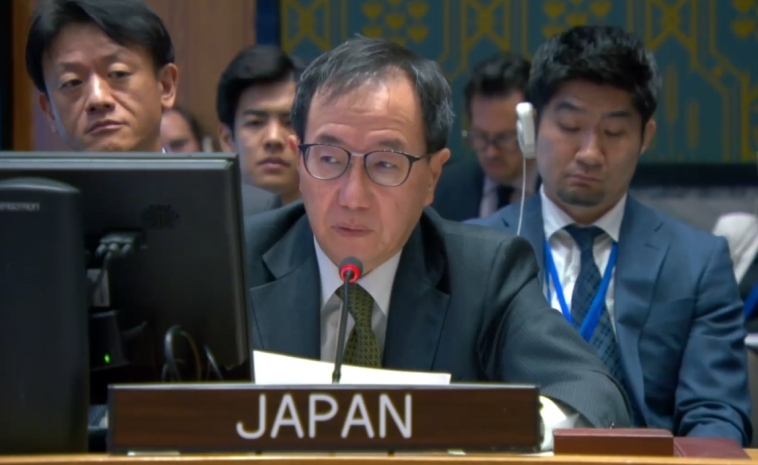アフガニスタン情勢に関する安保理ブリーフィングにおける山﨑大使ステートメント
令和5年12月20日

(As delivered)
I would like to start by thanking Special Representative Otunbayeva and Director Rajasingham of OCHA for providing an update on the situation. I also thank Ms. Shaharzad Akbar for her remarks on the dire status of Afghan women. My appreciation also goes to Ambassador De La Gasca of Ecuador.
More than two years have passed since the Taliban takeover in 2021, and the international community's interest in Afghanistan appears to be gradually waning. However, the humanitarian and human rights situation, as well as the political situation, remain severe. The economy is somewhat stable but at a very low equilibrium. While the UNODC’s survey found that opium cultivation decreased substantively, which should be welcome, more assistance is now required for rural communities that had relied on the opiate economy. While security has improved overall, sporadic terror attacks are alarming.
The strong earthquakes that hit Afghanistan in early October caused tremendous damage and casualties in Herat Province. I would like to express condolences to those who lost families and loved ones. The recent mass influx of Afghans from Pakistan is also of humanitarian concern.
It goes without saying that we remain highly concerned about the human rights situation of women and girls. Japan urges the Taliban to reverse its restrictions on the freedom of women and girls so they can realize their full, equal, meaningful and safe participation as called for in Resolution 2681.
Mr. President,
The international community should maintain and increase its commitment to Afghanistan. The people of the country need to be empowered through greater engagement and more international support. For Japan’s part, our Embassy in Kabul has continuously and directly urged the Taliban to remove its repressive policies, listen to the people’s voices and build a constructive relationship with the international community. At the same time, we have coordinated with the Taliban to make social and economic progress, and we have provided assistance for the Afghan people.
As part of our efforts, Japan recently announced approximately USD 58.4 million of assistance which will be provided mainly through UN agencies to support Afghan people who are facing a multi-faceted humanitarian crisis.
Mr. President,
On this occasion, I would like to touch upon the Independent Assessment, which was provided to the Council by Special Coordinator Sinirlioğlu in accordance with Resolution 2679. Japan welcomes this comprehensive assessment, in particular its emphasis on engagement and the need to promote confidence building with the Taliban.
I am confident that this assessment will serve as a good basis for discussions on our way forward. Now, the international community should recognize the need to increase international engagement in a more coherent, coordinated, and structured manner, and make sure the assessment’s recommendations are implemented properly.
In this context, I welcome that the Secretary-General expressed his intention, in his latest report, to convene the next Special Envoy’s meeting. Japan will actively participate in this important conference to form an internationally coordinated approach to Afghanistan. We also believe that a United Nations Special Envoy should be appointed to facilitate engagement among relevant stakeholders as recommended in the Independent Assessment. I would like to emphasize that the role and expertise of UNAMA remains critically important, and I am sure that the UN Special Envoy and UNAMA will work closely and complement each other’s roles.
The Taliban’s posture on this independent assessment is also important. I encourage the SRSG and UNAMA to continue to communicate with the Taliban on this matter. The Japanese Embassy in Kabul will also actively engage in communicating the spirit of the independent assessment.
In conclusion, I stress that Japan, a co-penholder on this file, will continue to address this issue in order to see peace, stability and prosperity for the people of Afghanistan.
I thank you.
